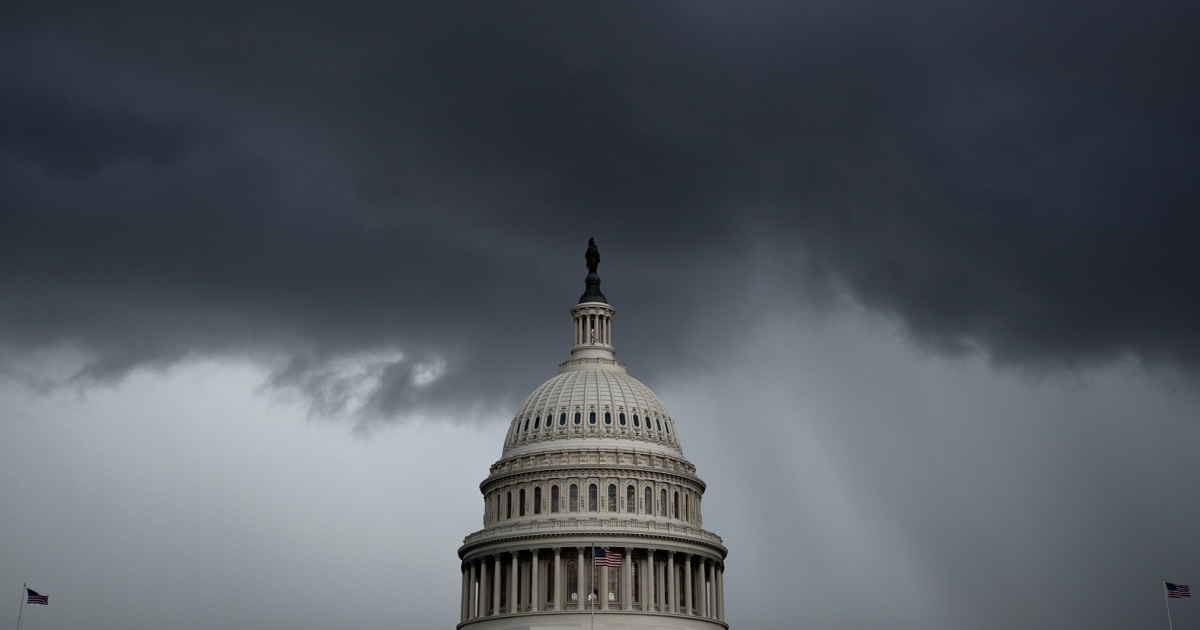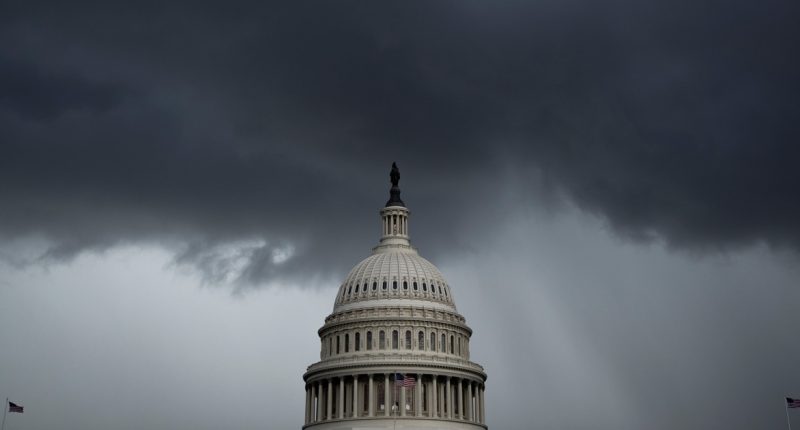
One of the biggest divides in American politics isn’t red versus blue — it’s the divide between what the elected officials think and believe and what their own voters think and believe.
We rarely focus on this divide because we rarely have the actual data to back up the thesis, though you might occasionally hear a reporter say something along the lines of “What they believe and how they vote are two different things.”
Thanks to researchers at UMass-Amherst, we now have answers to this question thanks to one of the more unusual surveys I’ve seen in a long time. Led by one of the school’s co-directors of the poll, Alex Theodoridis, they decided to survey former living members of Congress.
According to their methodology statement, 293 former members responded to the online survey, and 237 of them completed the survey, out of more than 500 former members of Congress asked to participate through the U.S. Association of Former Members of Congress. The party split among their respondents was 55% Democrats and 45% Republicans, and 44 states and one territory were represented. It’s worth noting that 83% of the sample was male and over 90% was white, which shouldn’t be a surprise, because Congress’ ranks have been overwhelmingly white and male until relatively recently.
What makes this survey worth chewing over is that UMass compared the answers the former members of Congress gave with how the general public over the last year has answered some of the same survey questions. UMass regularly conducts national polls, and it used a merged sample of its 2023 data for comparative purposes.
And what it found: The former elected members of Congress, especially the former Republican members, appear to view the democracy a lot differently right now than rank-and-file GOP voters.
Let’s start with the big question of whether the 2020 election was legitimate.
Among Republicans nationally, just 26% believed Joe Biden’s victory was legitimate. Among former GOP members of Congress, a whopping 82% believe he won legitimately.
On the issue of whether Donald Trump’s election fraud claims “threaten” democracy: Just 18% of GOP voters believe that, yet 64% of former GOP members of Congress do.
And then there’s the Jan. 6 riot at the Capitol. Among GOP voters, 74% believe the attack was simply a protest, and only 14% of GOP voters call it an “insurrection.” But among the former GOP members of Congress, 53% described it as “an insurrection,” while 54% called it a protest. (Yes, there are some who believe it was both a protest and an insurrection.)
The former lawmakers also had an opportunity to answer some open-ended questions, and the resulting word clouds are quite telling. For instance, when they were asked to describe the current state of Congress, the most commonly used word was (drum roll, please) “dysfunctional.” Not a shock, given how often current members of Congress use that word to describe the place.
When it came to describing the overall political environment, the three most commonly used words were “polarized,” “toxic” and “media” — and, if it’s not obvious, the appearance of the word “media” was a negative.
And more than 80% of the former members believe the legislative branch has ceded too much power to the executive, while over 60% believe the legislative branch has also lost too much power to the judiciary. That was a belief that crossed party lines.
But the big news in this project was the divide between elected Republicans and their voters. One of the most striking statements I remember reading during the attempt to certify the 2020 election came from GOP Rep. Tom Cole of Oklahoma, a longtime member of Congress who has a reputation as being one of the “grownups” in Congress. Here was his statement in full on Jan. 6, 2021:
On behalf of my constituents, I am casting my vote against certification of the Electoral College’s count of the presidential election results. The greatest function of a representative is being elected to represent the views of one’s constituency. I have been closely studying this issue and listening intently to what my constituents have to say. The voters I represent are not concerned about the fairness of elections in Oklahoma. However, they are concerned about fairness and transparency in other states. They have asked me to express their concerns with my vote on the floor today, and as their representative, I intend to do so.”
— Rep. Tom Cole, R-Okla.
Rarely had I ever seen a member of Congress choose his words so carefully, but the statement screamed that Cole didn’t believe Trump’s allegations. He began the statement with “on behalf of my constituents” and referred to his constituents’ beliefs and concerns multiple times. Not once did he say whether he believed his voters’ concerns. He instead hid behind the idea that he was simply serving as a literal “representative” of his constituents’ point of view.
One of my favorite questions to ask elected officials is how important their voters’ point of view is to their own decisions. Most of the time, members of Congress like to claim they are independent thinkers who take into account what voters sent them to Washington to do. Oftentimes, when members of Congress vote against their constituents, they’ll usually use language like “a vote of conscience” or, perhaps, say they decided to cast a vote that “was in the best interest of the country.”
But rarely do members of Congress so openly admit they are voting with their constituents without going out of their way to claim they are personally aligned with them, as Cole appeared to do.
So was Cole being principled or cowardly? The cynic in me believes he was simply trying to avoid a potential primary. And Cole has kinda-sorta hinted at that issue in the past. He said once: “Look, in my district I got 70% of the vote in the general election; the president got 66%. If we get in a fight, he’d probably keep his 66% and I’d keep my 4%.”
It’s what makes Cole a favorite source for many political reporters: He doesn’t try to come up with some phony rationale for decisions that seem at odds with his history. He is transparent about his own politics while also accepting the larger premise of the question.
But one can’t help but wonder, and be deflated, about how Cole chose to handle this issue. It may explain why there is such a divide between what members of Congress believe about the unsettling situation Trump is creating, with his constant attacks on the rule of law and the democracy, and what the voters actually think.
It’s obvious that members of Congress too often give in to the belief systems of their (sometimes overly whipped-up) constituents out of fear of losing their jobs. What’s less clear is exactly the price those self-preservation decisions cost us.
When Republican members of Congress complain about how misinformed their constituents are (which many of them do off the record or on background), they love to blame “the media,” including partisan outlets, for creating this environment. And while it’s true partisan media outlets have made everything worse in our democracy over the last decade, they couldn’t succeed in eroding trust in truth and democracy without the help of elected officials leading the partisan pander charge.
It’s easy to blame the messenger for our country’s polarization, and the media, no matter the flavor (partisan or not), deserves its share. But even partisan media is only as honest as the sources it puts on air. Many of the most egregious examples of misinformation come from elected officials.
The reality is that it has been the elected officials who have exploited voters’ misconceptions and used partisan media to traffic in this stuff. Media has amplified and, at times, echoed some of this nonsense, but it wouldn’t exist without the elected officials’ themselves using their legitimacy to give conspiracy theories, half-truths and lies the life they need to become currency.
I’ll never forget a conversation I had, when Trump was first elected, with a prominent Republican senator who pulled me aside while getting off of a plane and promised to stand up to Trump. They were the guardrail, they swore, against Trump’s running roughshod over the system and the Constitution. Needless to say, that senator’s pledge lasted less than a year.
Eventually, this person would essentially take the route Cole took on Jan. 6, claiming every one of their pro-Trump moves was a result of “listening” to their voters. Translation: This senator didn’t want to become the next Bob Corker or Jeff Flake, watching their favorability numbers tank under assault from Trump until they decided not to run for re-election. And yes, this senator is still serving.
So, back to the divide between what the voters believe and what former members of Congress believe. Should we take the divide to mean that when push comes to shove, when the chips are down, when the metaphors I’m trying to come up with are depleted, that elected officials will do whatever it takes to protect the republic regardless of the personal consequences?
I think you sadly know the answer, and that’s why there is growing concern that a second Trump term would erase any check and balance on his instincts inside the GOP. Instead of being a political party made up of various wings, it would be a party of one, with Trump deciding what is policy — and what is truth.
As has been said numerous times, authoritarians usually don’t take power, they are handed it, and the elected GOP class has gotten more comfortable handing power to Trump with every year that has gone by since he burst onto the scene in 2016.
Needless to say, this survey of former members of Congress only served to raise my concerns that their need to stay in office and stay in power would make a second Trump presidency anything but small-“d” democratic.
The best presidents, according to former members of Congress
Before I let go of his fascinating survey, another notable question involved asking those former members of Congress about the best Democratic and Republican presidents and congressional leaders of the last 70 years.
Collectively, Bill Clinton and Ronald Reagan came out on top of their respective partisan divisions. Former Democratic members of Congress ranked Clinton, Lyndon Johnson and Barack Obama as their top choices, while the former GOP members of Congress ranked John F. Kennedy, Harry Truman and Clinton 1-2-3 among Democratic presidents. That an interesting partisan divide.
On the flip side, former GOP members of Congress ranked Reagan, Dwight Eisenhower and George H.W. Bush as their top presidents, while the Democrats’ top three GOP presidents were the same, but in a different order: Eisenhower, Bush 41 and Reagan.
The simplest observation that jumps off the survey: Just one 21st century president made any top three, and it was Obama, who was ranked third among members of his own party. Even Republicans didn’t give Bush 43 much love in this survey. The 20th century presidents all look more bipartisan compared to their 21st century counterparts, and that is clearly reflected in this survey.
Why you should care about the Florida State snub
If you are still on social media, you may have noticed that something recently compelled me to do something I haven’t done in years: rant on social media. That’s because of the College Football Playoff’s decision not to invite undefeated Florida State University to its four-team tournament. (It’s hard to call it a playoff when there are no objective criteria for qualifying, only subjective ones.)
We live in an era when trust has been eroded across the board, whether in Congress, the White House, the media, college campuses, Hollywood, Silicon Valley — or, yes, sports leagues. Many of us are trying to find a way to improve trust and find objective ways to discern facts from mis- and dis-information. My beef with the CFP wasn’t its decision to leave out Florida State but that it seemed to invent the rationale after the results of the final games didn’t go the way it hoped they would.
To get you up to speed if you haven’t been paying attention: Florida State finished the season 13-0 and won its conference (the ACC). During its 11th game, against North Alabama, its all-everything quarterback, Jordan Travis, broke his leg. Despite the injury, Florida State won that week and the following two weeks, using a backup QB to win on the road against hated rival Florida and then taking the ACC title game with a third-string QB.
After week 11, the CFP ranked Florida State fifth, behind four other undefeated teams. After Florida State won its game against Florida with a backup QB, the committee actually moved it up to fourth, with one undefeated team (Washington) dropping behind it. Both Texas and Alabama were ranked behind FSU the entire time. But the next week, despite winning with its third-string QB, Florida State was dropped a spot, even though a team above it (Georgia) lost!
The committee could have moved Texas ahead of Florida State weeks ago — the week the injury happened. But doing it the way it did it sucked any integrity out of the process. And that’s what makes this so nauseating. Was the committee being dishonest with its rankings two weeks ago or in the final week? There’s no good answer for it to give unless it is honest about what it is really up to.
Look, the committee can do what it wants, and there’s no doubt that on paper, it has come up with some great matchups for ESPN to promote — after all, as my friend Tony Kornheiser likes to say, it’s a television show, folks. And it’s hard not to wonder whether there was a hidden programming hand involved with this decision, because the two schools that both jumped FSU were two of the most prominent media partners of ESPN — Texas (see the Longhorn Network) and Alabama of the SEC. (The ACC Network is also owned and run by ESPN.)
The ACC ought to ask itself why it’s in business with an entity that hasn’t helped the conference grow but, if anything, has hurt its ability to expand its bottom line. If you are a serious football school and not in the Big 10 or the SEC, it’s hard to look at this decision and think you won’t get a fair shake unless you, too, can get invited behind the velvet rope.
Beyond that, it really bothers me that the committee decided an injury should be used to punish a team for overcoming adversity. Can you think of anything less American than that? What makes sports great is when the improbable happens, not the probable. There’s nothing like rooting for an underdog, like a backup quarterback, and seeing how a human handles instantaneous trials by fire.
And, finally, there’s the presumption that Florida State would get smoked in any matchup with another finalist, leading to a less entertaining TV show. But there’s no way to know.
As artificial intelligence rises in use, I’ve entertained concerned thoughts that we may “project” a lot of decisions without allowing humans to be humans. I sure hope sports doesn’t lead the way with this trend. If so, then we might as well simply use video games to simulate the real games.
Source: | This article originally belongs to Nbcnews.com










